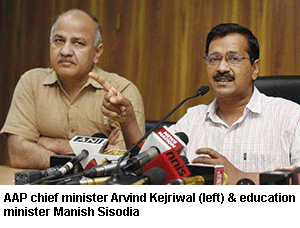 Nearly a decade old tussle over refund of ‘excess fees’ (amounting to over Rs.300 crore) collected by 544 private schools in Delhi in the wake of the 5th and 6th Pay Commission awards entered a decisive phase on August 16, with the Delhi (state) government submitting a list of 449 ‘defaulting’ private schools against whom it has initiated takeover/nationalisation proceedings.
Nearly a decade old tussle over refund of ‘excess fees’ (amounting to over Rs.300 crore) collected by 544 private schools in Delhi in the wake of the 5th and 6th Pay Commission awards entered a decisive phase on August 16, with the Delhi (state) government submitting a list of 449 ‘defaulting’ private schools against whom it has initiated takeover/nationalisation proceedings.
This standoff between the AAP (Aam Aadmi Party) government, which swept the state legislative election in 2015, and Delhi’s private schools has its origins in the appointment of the Justice Anil Dev Singh committee in 2011 to investigate schools which had raised tuition fees on the plea that they were compelled to do so because following the 5th (1997) and 6th Pay Commission (2007) awards, their expenditure had risen commensurately. Under a directive issued by the government in 1997, private schools in Delhi state are obligated to pay their teachers the same pay scales as teachers in government schools.
But well before the Anil Dev Singh committee was appointed, writ petitions were filed by the Delhi Abhibhavak Mahasangh, Social Jurist and Faith Academy Parents Association in the Delhi high court challenging the increase in the tuition fees of independent private schools in Delhi to meet 5th Pay Commission obligations. Following this, the then Congress government of the state issued an order under which if schools’ reserves were insufficient, tuition fees could be increased to the extent required after consultation with their PTAs (parent teacher associations).
Even as these petitions were pending, private schools again hiked fees to meet 6th Pay Commission teachers’ pay obligations. Following renewed protests by parents’ representative organisations, in 2008 the state government constituted a committee under retired IAS officer S.L. Bansal to examine the implications of the 6th Pay Commission for private schools. The Bansal committee submitted its report in 2009 and in accordance with its recommendations, the government allowed unaided recognised private schools of Delhi to hike their tuition and development fees with retrospective effect, from 2006, only if existing reserves weren’t sufficient to meet the teachers’ pay liabilities. For this, schools were grouped in five categories on fee differentials and an average fee hike of 20 percent was permitted.
Meanwhile, the Delhi Abhibhavak Mahasangh filed a second writ petition questioning the validity of the state government’s order of 2009 based on the Bansal Committee’s recommendations and inter alia demanded that the “excess fees” paid in the period 1997-2009 be refunded to parents. The petitioners also argued that the state government should ensure government audit of schools accounts as per s.18 (6) of the Delhi School Education Act (Rule 170), on regular basis. This argument was accepted by the court which held that private schools are obliged to submit their accounts for government audit and also submit a statement of fees in advance before the commencement of every academic year for approval by the ministry of education.
More importantly, it held that the director of education of the state government has the authority to regulate the fees of private schools under s.17 (3) of the Act. Subsequently in 2011 the then Congress-led state government on orders of the Delhi high court appointed a committee of three members under the chairmanship of Justice Anil Dev Singh, retired Chief Justice of the Rajasthan high court, to examine records and accounts of all 1,600 private schools in Delhi.
Based on the Anil Dev Committee’s ten interim reports, which has completed inspection of over 1,000 private schools thus far, the Delhi government has been ordering the schools to refund excess fees to parents as certified by the committee. However, 449 of them have ignored the government’s directives despite repeated reminders, prompting the takeover threat. The schools contend that the calculations of the committee are not correct and there is no redressal mechanism for schools to appeal. “The Justice Anil Dev Committee has overstepped its brief and included development and other charges in its calculations, which is an injustice to private schools,” says S.L. Jain, vice president, Action Committee for Unaided Schools and director, Mahavir Senior Model School, Delhi. Representative associations of private schools also complain that most member schools are not able to understand the complex calculus of the Anil Dev Committee.
Quite clearly the terms of reference of the Justice Anil Dev Committee are confusing and opaque, and more so the basis of its calculus under which it fixes the ‘excess fees’ of each school. Moreover, the committee’s terms of reference don’t provide a forum — other than the judiciary — to dispute the calculus methodology and the refund amount adjudicated by the committee.
But the major consideration hovering over this issue is the constitutional validity of s. 17 (3) of the Delhi School Education Act, 1973 which obliges private schools to disclose their tuition fees to the state government’s directorate of education. In the landmark judgement of a full bench of Supreme Court, in T.M.A. Pai vs State of Karnataka (2002), a full bench of the court held that private educational institutions have a fundamental right to ‘administer’ themselves, i.e, levy ‘reasonable’ tuition fees, correlated to their investment. According to Ashok Pandey, chairperson of NPSC (National Progressive Schools Conferences), a writ petition questioning the constitutional validity of s. 17 (3) has already been filed by NPSC
Yet at bottom, it’s a telling commentary on the state of Indian K-12 education that private schools — which are clearly preferred by the public — have to expend so much time and money in courtrooms rather than classrooms.
Autar Nehru (Delhi)























